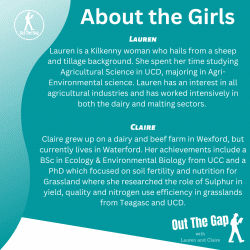Out The Gap – Issue 9


Nitrate Regulations 2024
The review of Ireland’s nitrate derogation regulations and changes to dairy cow banding will put significant constraints on the recent increase in production and expansion on dairy farms.
The nitrates derogation allows farmers to exceed the limit of 170kg organic nitrogen per hectare (N/ha) up to the maximum of 250kg N/ha provided adherence to stricter rules. However, the maximum 250kg N/ha is set to be reduced to 220kg N/ha in January 2024 in certain areas.
From January 2023, there was new excretion rate bands for dairy cows depending on litres produced. This is called ‘banding’. Previously, all dairy cows were considered equal in terms of nutrient excretion rate, 89kg N/ cow per year.
Table 1: Bands for dairy cows according to milk yields

Also in terms of litres, 1.03kg = 1L of milk, for example in band 2: herd averages from 4500kg or 4,370L/cow and less than 6,500kg or 6310L/cow.
For a farm moving into band two there is a N excretion rate increase of 3.4%, and for herds moved into band 3, a 19% increase in N excretion rate. This increase could either move them into derogation (170kg/ha) or now exceed the new lower upper limit (220kg/ha). Dairy farmers had until the 30th September to declare the nutrient excretion rate band that is most suited to their herd, made online through ICBF.
Also, dependent on which band your farm falls into, the amount of organic phosphorus /ha excreted increases from 12kg P/ha (band 1) to 15.8kg P/ha (band 3), table 1. This will affect the amount of chemical P allowed to be spread. Farmers above a stocking rate of 130kg N/ha must take soil samples, where soil samples are not taken, index 4 for P will be assumed and no chemical P will be allowed spread on that land. However, if on low P indexes (1 and 2) farmers can apply for P build up, available to farmers operating above 130kg org N/ha, +30kg P/ha (index 1) and +20kg P/ha (index 2).
From 2023, the spreading of soiled water will be prohibited for all milk producers from 10th and 31st December 2023. From 2024, this closed period increases from 1st to 31st December with exception of winter/liquid milk producers.
The Department has advised a number of measures to be undertaken to avoid exceeding the nitrates limits of 170kg/ha to 220kg/ha for derogation farmers. Such as:
- Reducing livestock numbers on farm / Contract rearing
- Exporting slurry / farmyard manure
- Renting additional land
However, farmers who previously exported slurry, to stay below the nitrates limit, will now become more difficult since two changes the nitrate regulation came into effect:
- The N content of a cubic meter (m3) of slurry has halved, changing from 5 to 2.4kg N/m3. The result of this change is that double the volume of slurry has to be moved to achieve the same reduction in N.
- Grassland and tillage farms stocked above 130kg N/ha are assumed to have high phosphorous (P) levels unless an in date (<4 years old) soil analysis shows otherwise. Therefore, farms and fields without soil samples will not be able to receive manure from another farm.
The reality of each of these measures is how can farmers continue to be profitable when milk output will be reduced, those of which may be of high EBI and genetic merit, and the scarcity and soaring cost of leasing land continues.
Recent analysis from IFAC brings the reality of the financial impact the reduction of nitrates upper limit on higher-yielding herds. According to the report, derogation farms operating in band 3, the upper limit of the nitrates derogation will lose between 12 – 37% in profit resulting from derogation changes. Analysis looks at a current stocking rate of 247kg N/ha having to drop to 220kg N/ha. The link below provides the different scenario options available to a farmer and the reduction in profit as a result of such changes provided by ifac.
Each farm is specific to there own circumstances and farm options are subject to farm objectives. Such financial impacts can cause major concerns on family farms across Ireland. However, it is inevitable that this new nitrates directive will force a reduction in cow numbers on farms. Grassland Agro have a team of trained Technical Sales Advisors who are fully competent in Nutrient Management Planning to help farmers consider their options and understand the regulations better.

